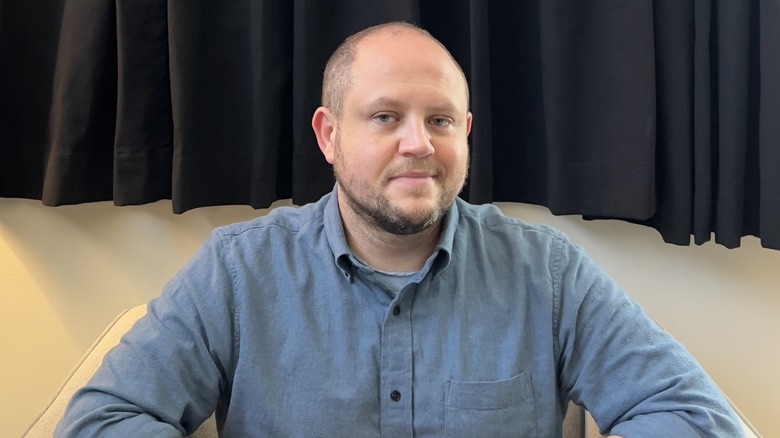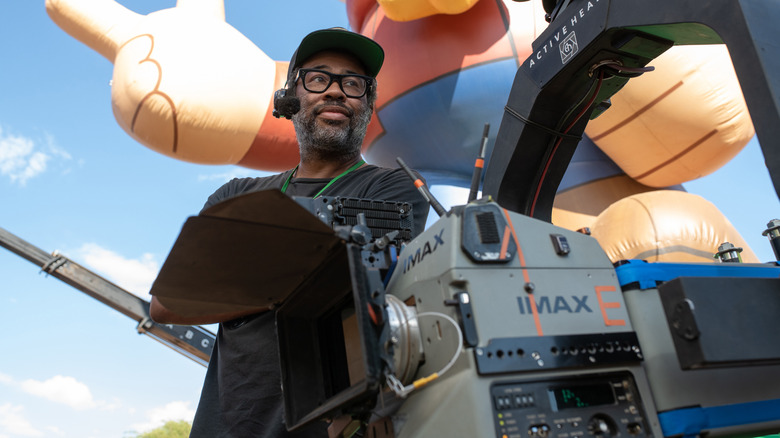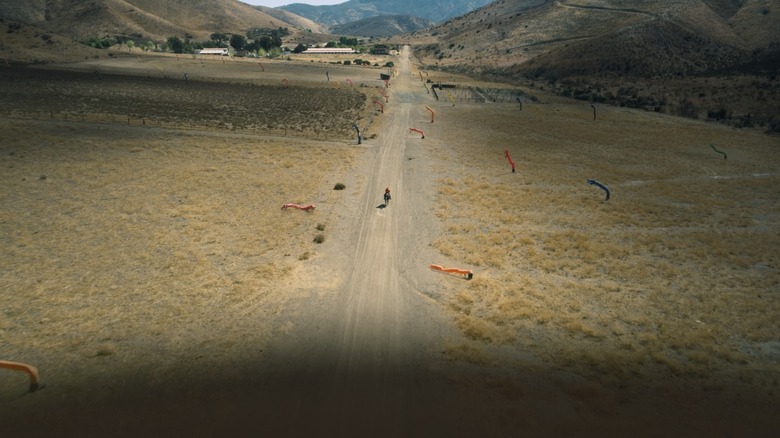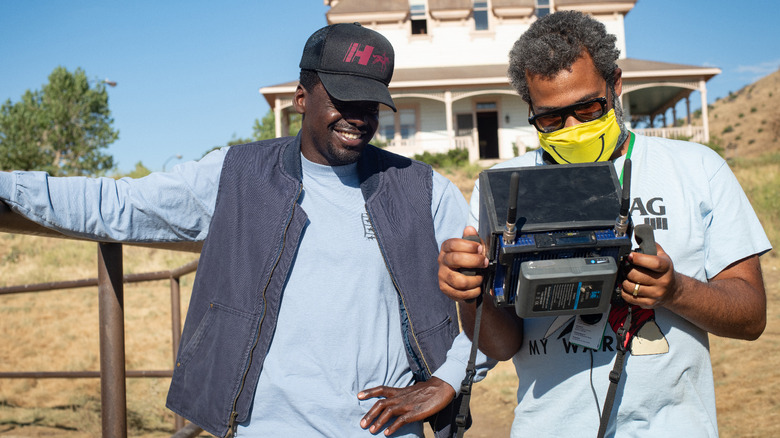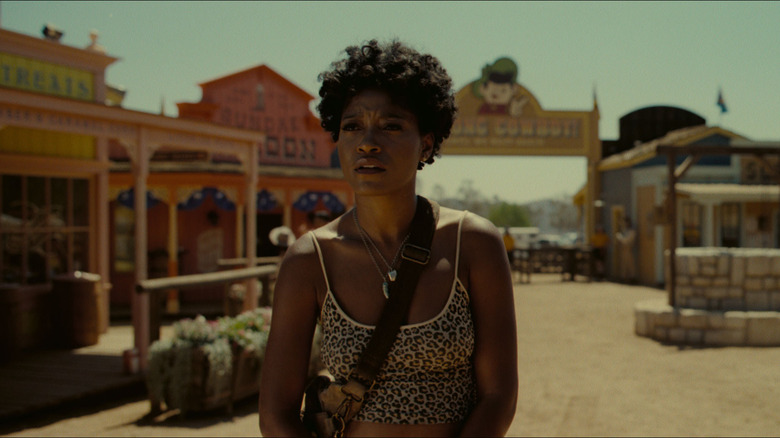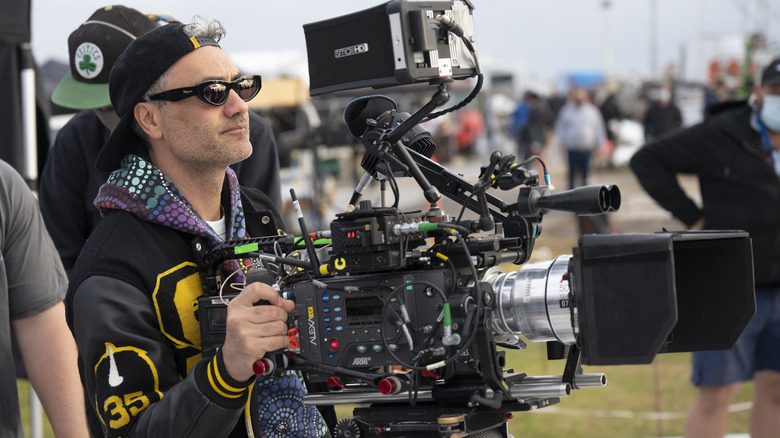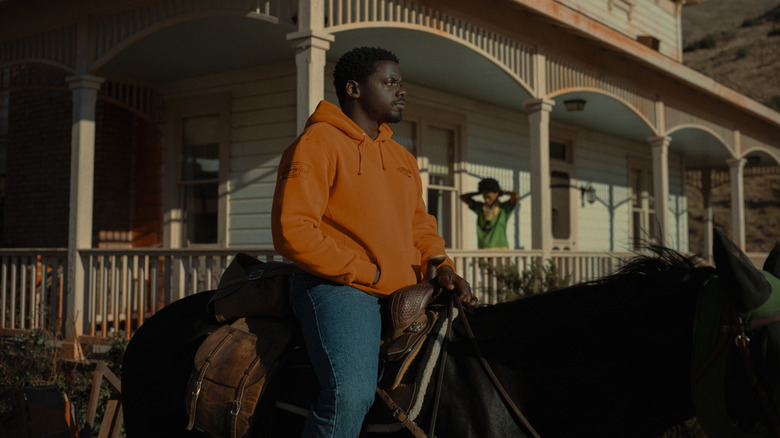Nope Editor Nicholas Monsour On Working With Jordan Peele, The Movie's First Cut Length, And More - Exclusive Interview
"Nope" is the third feature from writer-director Jordan Peele, who continues to explore the tropes of genre through a modern prism of dark humor, social commentary, race and class. Following his previous efforts, "Get Out" and "Us," Peele tilts more toward sci-fi than horror this time, chronicling the efforts of two sibling to capture photographic evidence of an alien object that is terrorizing the valley in which they live and work.
For O.J. and Emerald Haywood (Daniel Kaluuya and Keke Palmer), who are trying to save their struggling business (which provides trained horses for Hollywood productions), the UFO in their vast backyard represents encroaching forces that they may not be able to fully control but need to document. "Nope" is about what we see when we look at images, both in life and on film, and how we often don't fully understand those images or the true meaning behind them.
Peele recruited a number of his regular collaborators for this film, including editor Nicholas Monsour. In addition to editing "Us," Monsour has also worked with Peele on his "Twilight Zone" reboot and "Key and Peele," while also recently editing an upcoming film from "Thor: Love and Thunder" director Taika Waititi, titled "Next Goal Wins." About reteaming with Peele on "Nope," Monsour tells Looper it was a no-brainer: "It basically ticked a lot of the boxes of things I've always wanted to experiment with," he says. "I knew the imagery and the material I was going to get was going to be incredible."
What it's like to work regularly with Jordan Peele
You've worked with Jordan now a number of times, on two features, a bunch of TV shows. Are you and he at the point now where you've got a shorthand and you can get into each other's minds a bit?
We come loaded with knowing generally what to expect in terms of the things we're thinking about, interested in, and how we go about different aspects of our jobs. There's a lot that we're not learning anymore about each other, but one thing we have in common and one reason I believe we work well together is that Jordan's always challenging himself, trying to reinvent the way he does what he does. I also have to try to do that.
We probably could be making ourselves a lot more comfortable than we are, but there's always a new challenge and always new stuff to figure out, so we're figuring out how to do each project on its own terms each time. I started working with him almost eight years ago, so there's a part of editing that really is hanging out and being able to talk about ideas and that part only gets more comfortable and better the longer you do it.
What was the brief on "Nope" when he first approached you about working on this? What did he tell you he'd be looking for?
Two things. One is Jordan's an amazing collaborator in that he's extremely generous with how inside his own thought process he allows you to be. Before he even had completed a script, he would take me out to lunch and tell me the whole idea as though he had to pitch it to me, which he doesn't have to, but it's part of his process to talk through it with the people he's going to work with. He did the same with the actors and the cinematographer and the production designer. He goes through this series of conversations with the people he's going to work with as he's developing it.
One thing that's really exciting about the position Jordan has created for himself is that he's the brand, he's the IP, he's the writer, he's the director, and he's the producer, so he continues developing the project the whole time. As it's building, he can pivot and tweak, rather than feeling locked in and beholden to some material that wasn't his. There's a core idea and core set of characters. As they find the locations, he thinks, "Ooh, that's interesting. Maybe we should tweak this aspect or that aspect of the plot," based on the realities of the casting, the production design, the locations, all of that.
The core brief was there about the family, the brother-sister relationship, the peripheral relationship to Hollywood and mass media, and how that related thematically to an encounter with something incredibly powerful and "other," and the voyage of discovery of figuring out what it is and why we're driven to try and capture and understand something like that, like a UFO or an alien or anything like that.
That said, the other part of what he definitely made very clear was he was throwing everything he had at "Nope" creatively that he could, and that he was inviting me and the other collaborators to bring all the ways we think our jobs should be done to this project.
What made filming Nope different from Jordan Peele's previous movies
What were some of the things you got to do that maybe you hadn't had a chance to do before?
A few things. We got to get really specific about sound and music, which are the dance partners with the picture. We got to talk about it much earlier and start developing a creative palette and shared language with the sound designer and the composer well before production, same with the concept art for the visual effects. Jordan started working on that very early and then that became a dialogue with the sound designer, so the VFX and sound designer could kind of emerge collaboratively.
That meant that I was getting loaded up with material like previs[ualization], concept art, storyboards, early libraries of sound design I was requesting from the sound team, as well as talking with the production sound mixer about how we were going to manage some difficult recording situations with really loud film cameras, with stunts and fans blowing and all that on location.
It allowed us to hit the ground running. Not to get too technical, but part of the concept and the storytelling of the movie is about film and capturing imagery. Because of that, there's about eight different formats that the film is captured in, so that creates its own challenges too and its own opportunities to explore different visual looks and storytelling languages.
We got to do some tests early with our dailies facility and our online facility and the camera team doing tests. Everybody was not just turning up on day one with the gear they used on the last show or the setup they had on the last project. They were using an extended, generous prep time to build the specific set of tools and processes for this one based on the script and the ideas in the script, which isn't totally unique, but it was followed through and supported in a way that was unique.
It meant I had more time to think about and break down the script in various ways and talk about the structure and the ideas as he was still working on them and planning them. One of the languages Jordan and I communicate with through is music. He'll say, "Send me whatever this is making you think of," and he'll send me the things that he's thinking of and [it becomes] a nonverbal back and forth with music that's going on while he is writing , and then random YouTube videos and stuff in the middle of the night about various odd sea creatures or whatever else might enter into the weird world of "Nope."
Jordan Peele's first cut of Nope was almost twice as long as the finished film
We've all heard about directors who do dozens of takes. Where does Jordan fall on that spectrum in terms of how much he gives you? Do you have the opportunity to give him different options of how a scene is going to look?
Overall, Jordan's a very decisive and focused director on all the projects I've worked on with him. The whole thing has a focus and a conciseness compared to many other types of directing and filmmaking I've been involved in. That said, each project's been a little bit different and part of what made "Nope" really special is that he had more resources to flesh out the whole world that the events were taking place in, which meant the actors and the camera people got to explore a little bit more. They made sure they got that and then they were able to embellish and add on in some unexpected ways ... there's a sense of wonder that's crucial to the whole film and they were able to hunt that down out there.
The other thing is that with his history of performing himself, he understands that every actor has their own process. Casting is a huge part of his process. He makes sure that there's a real respect between him and the performers about how they work and how he works. Some actors might flourish by doing a bunch of takes and trying a bunch of different things and he'll give them that time. Others might prefer to roll in fully loaded, get it done and move on, and he can work that way too without pushing them, so focusing on performance is a big part of his process.
Do you remember how long the first rough cut was? Was there a lot that got tossed over the side on the way?
It might be misleading when a lot of people say that only because there's different kinds of first cuts. Some are the result of an extreme delusion on the part of the director where somehow, they thought this was all going to go into a movie and they don't know what to do now that it's four hours long or whatever. Other times, that's in there by design, and they know that the movie they want to make only can really emerge by whittling down and shaping a lot more material because you can feel when there's more there, rather than when you've only got a specific slice and that's all you get to see.
This was a pretty long assembly. It was close to four hours, but it felt less like a much bigger story that we had to structurally alter, and more like the movie plus an exploration of each setting and each character that was more in depth. We got to focus and, through the process of editing, hone in on the details of each space in each character that felt most interesting and exciting beat by beat.
They were going into some of the same layers repeatedly in different environments to see where things would be more interesting. In the first act, is it more interesting to learn about O.J.'s vulnerability or relationship with his dad, or is that better to leave for a later scene? They got options for these character revelations or world building. We got to experiment and explore with these other layers of background and exposition, but the story was pretty much the same in the four-hour version as it is in the two-hour-and-10-minute version.
How to edit a movie into existence
There's that expression, "You find the movie in the edit," which can be a double-edged sword. Have you ever been in a situation — no names mentioned — where you literally had to dig a movie or TV show out of the raw footage you had to work with?
Absolutely. There is an element of that, which is true on every project, in that the way you say something can completely change its meaning.
It's experimenting with the dynamics of the ride, because the script may have had a completely different implication. When they were shooting, they may have thought, "This will be great, because it'll all be building towards this, and then this will really change the tone." But then when we put it together, we figure out from the experience of watching it that, no, actually, that made sense when thinking about it, but now that you see the performances, now that you see the real locations and how they looked on film, it makes more sense to do it a different way.
There's an aspect of making a film where you can't just rely on the script or what you thought the movie was going to be like beforehand. Jordan can unilaterally decide to adjust a fundamental concept in the story at any point and is always right there to talk with about it, which is a different experience than when you, as an editor, get handed something that doesn't bear any resemblance to the script or what they said they wanted, and they're not there to tell you what it is they are looking for.
In that instance you have to take a swing, respond, watch the footage, and think about it in as an objective way. What is the material actually telling you? Is it funny? Is it scary? Is it dramatic? Is it something that is going to need to be heavily manipulated with music or effects, or is it something that can be presented raw?
I've definitely been in that scenario and that can be a really creative and rewarding process. I always think the key to it being not a nightmare is communication and getting into a clear deal with somebody. What do they expect from you? What do they want you to bring? At the end of the day, as long as I leave an edit knowing that they're happy with the result, I'm also happy about it. You're there to support someone else's vision, and sometimes they don't know it until they see it, but that's not the case with Jordan.
Working with Taika Waititi vs. Jordan Peele
You've also recently worked with Taika Waititi, a director who is also very much a brand unto himself. Do you see similarities between guys like Jordan and Taika in that they have a very distinct vision? Are there differences between them and the way they work?
I definitely see a big similarity in that they're both really generous and so focused on the experience of their audience, and they want to make the movie that they've always wanted to see and that they have a hunch that their audience also has been wanting to see. There's a place for, and I actually love a lot of films that feel like they come from someone's imagination and they're not particularly concerned whether you understand it or not.
That can be an interesting experience, but something that links a lot of the directors I've enjoyed working with is that they're always looking for that experience that translates to the audience. They're both also incredibly funny guys, but in a lot of ways, very different.
Taika famously, if you read accounts of his films, will experiment to a high level. The film I worked on, there were many options to work with, down to the plot level. They would try new things in a scene unscripted, improvised, based on the character, that would create ramifications for the whole rest of the movie's plot. Then, they'd be thinking about tracking that or not, and very loose, but a controlled looseness where if it felt like it was improving the project and making it better, he would go for it.
They both could probably work the way the other one does and they treat each project differently, but my experience of working with Taika was that it was an even more extreme version of figuring it out in the edit, but intentionally doing that, intentionally creating a whole variety of possible edits that he would then would go and figure it out.
Plus, he likes working with multiple editors: "Great. I see what you see in this material, now let's see what someone else sees in this material." It's a very clear contract you're getting into where you know that's what it is going into it. It's really fun to see what another editor does with the same material, as long as your ego isn't bruised that you don't get to control everything about it or whatever, which isn't how most collaboration works anyway.
From what we've read, there's apparently a whole other "Thor: Love and Thunder" we haven't seen with additional cast members...
I'm sure. The amount of material he generated on "Next Goal Wins" was truly astounding, because it was all really funny. There was one joke that through all the takes ... we create select reels where we have every option of the way a line was read. With comedic actors, they'll say, "Okay, now riff the end of that line, whatever makes you laugh the most." We had one with 97 options for the same line and they were all really funny, so yeah, a lot of options there.
What Nicholas Monsour loved the most about Nope
What spoke to you about "Nope"?
I loved its cultural specificity. I'm from L.A. and I've driven around and know people who've grown up in the suburbs or up in the Santa Clarita area. I love the specificity of that, because I think you can get at much deeper, more universal truths often through real and researched specific types of characters and backgrounds. If you try to make something too general and generic, you often lose something you can't reverse engineer that actually speaks to the human condition.
I really loved that. As a film nerd myself, I loved his inspiration with the Eadward Muybridge footage. There's a film by Thom Andersen called "Eadweard Muybridge Zoopraxographer" that I love, that gets into some of the stranger conceptual ideas about where film came from and why it was developed the way it was.
Jordan was thinking about all of that, but seemingly very effortlessly and in a way that seemed to emerge from these characters in an organic way. Plus, I've always been attracted to sci-fi and fantasies from the sociological side, as a weird distorted mirror through which you then get to see and think about the structure and conditions of your own life more clearly and critically.
I'm always looking for a way to be involved with that, but also bring the most creative and thoughtful version of the craft I've been learning to it. This was an opportunity unlike any other to do that. It basically ticked a lot of the boxes of things I've always wanted to experiment with and then knowing some of the collaborators already, knowing I was going to get to work with [composer] Michael Abels again, and [production designer] Ruth De Jong, I knew the imagery and the material I was going to get was going to be incredible.
"Nope" is now playing in theaters.
